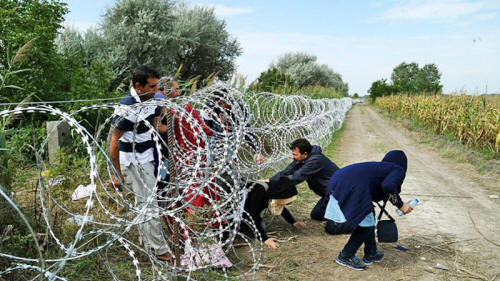|
from Technocracy.News Website
Migrants in Hungary
(Wikipedia)
Depending on where you live and how sensitive you are to the global mass-immigration crisis, your reaction to it will be somewhere between head-scratching and shell-shocked incredulity.
The purpose of this report is to give you some concrete evidence about where these policies originated and to what ends they were created.
A major player is Peter Sutherland, who in past years has served,
...among other things.
Most importantly, however, he is the European Honorary Chairman of the elitist Trilateral Commission.
His relevance to this article is that in 2006 he was appointed by the United Nations' to be the Special Representative of the Secretary-General for International Migration.
Needless to say, whatever comes out of Sutherland's mouth is certifiably representative of official policy of the Trilateral Commission and the global elite at large.
In fact, he is one of the most respected policy-makers in the world, and many consider him to be the "father of globalization".
The migration crisis in Europe came to global attention in the fall of 2015.
Headlines like these were seen in the European press:
Sweden first opened its doors to Muslim immigrants in the 1970s.
The trickle of migration was slow at first, but increased over the decades as turmoil in the Mideast produced more refugees. Today, Sweden's culture is as much Islamic as it is Swedish.
Muslims have steadfastly refused to assimilate into Swedish culture, and now the nation is paying a high social price for their naitivivity:
In spite of the European crisis, Sutherland wrote in late 2015,
Since his 2006 appointment to the UN, Sutherland has stumped this message across Europe with great fanfare.
With the combined weight of the United Nations behind him, governments were persuaded to further open their borders to immigration. A growing multi-cultural society, he claimed, was the only pathway to Sustainable Development.
Sutherland is the leading apologist for Federalism in Europe; that is, dissolving national borders completely and simply merging all cultures into one big happy family.
The obvious shortcomings of these policies have not deterred Sutherland - or the UN - from stating that more migration, not less, is the answer to the current crisis.
At the peak of the migration crisis in November 2015, and just after the horrific Paris terrorist attacks, the headline appeared, UN warns Europe against 'backtracking' on migrant commitments. Really...?
The article scolded European leaders:
It is not surprising that migration is now included as an official part of the UN's 2030 Agenda that created the 17 Sustainable Development Goals (SDGs) in November 2015.
Sutherland addressed this in his report, Migration is Development - How Migration Matters to the Post-2015 Debate:
Goal 10.7 of the SDGs reflects this to,
In Migration is Development, Sutherland wrote,
Sutherland's use of the word "interdependence" will be remembered by early students of Trilateral Commission literature from 1973 onward.
While the Commission may not have invented this word, they certainly popularized it in the context of globalization. However, there was never any demand or need for interdependence among nations, but Commission doctrine insisted that it was a given fact of life and that nations were going to necessarily meld together.
In summary, this is where modern migration policies have come from. Open borders and unlimited mobility of foreigners are in. Immigration restrictions of any sort are out.
By now, you should not be surprised to realize that the policies seen in Europe are identical to those seen in the United States, especially with respect to the border with Mexico.
Even when Congress has legislated wall-building and approved funding, the Executive Branch of government has flatly refused to comply, and we are left with an open-sieve border that has allowed millions of undocumented persons to enter.
Such has not been a partisan issue, because Republicans have been just as complicit as Democrats in shunning border controls.
Sutherland and his fellow Trilateral Commission cronies in Europe were primarily responsible for the creation and advancement of the European Union system of governance. The Commission has exerted a similar hegemony in the United States since the election of Jimmy Carter and Walter Mondale in 1975, both of whom were Trilaterals.
Subsequent Trilaterals include, Obama is not a member but he is surrounded by Trilaterals.
Economic and trade policies have been dominated by Trilateral members:
Finding the same migration policies in two different parts of the world strongly suggests a single source, namely, the Trilateral Commission.
|


